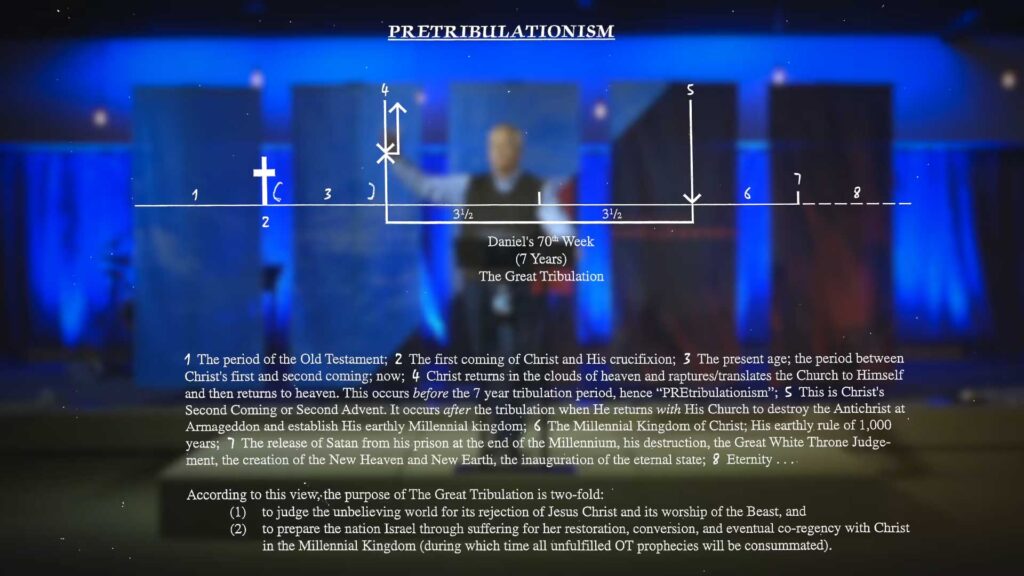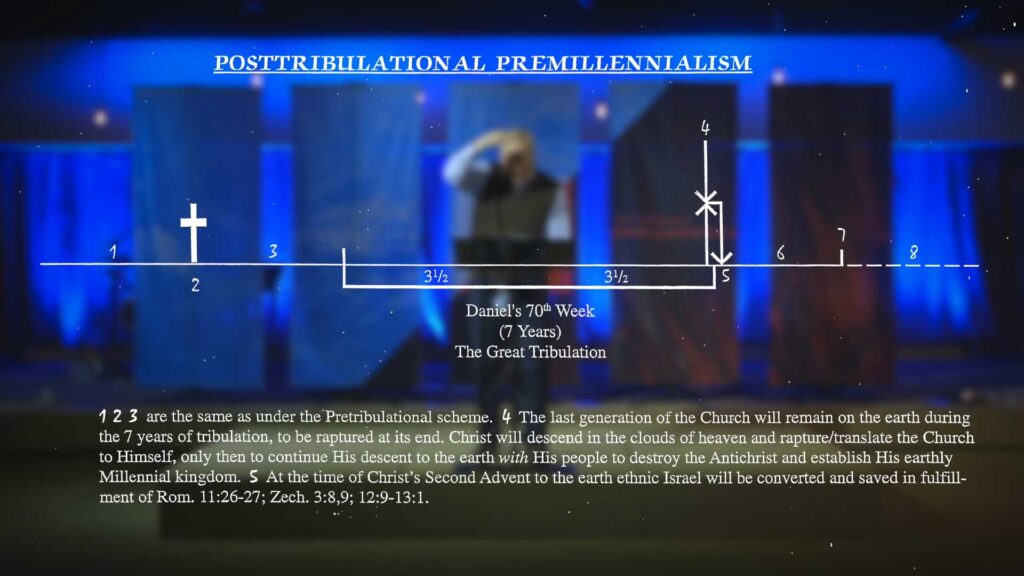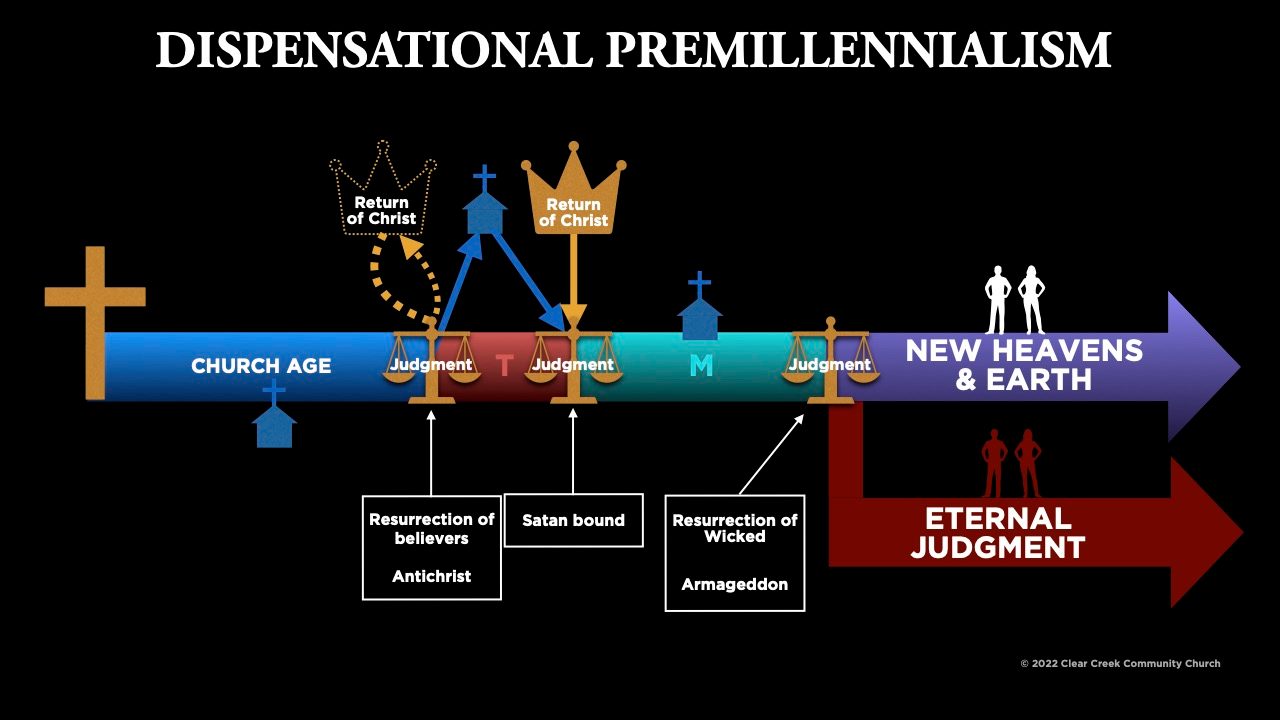Introduction
Dispensational Premillennialism, a distinctive theological perspective, emerged prominently in the 19th century, significantly shaping contemporary Christian eschatology. This essay explores the origins, core tenets, and impact of Dispensational Premillennialism, highlighting its development through key figures and its influence on modern Christian thought.

Origins of Dispensational Premillennialism
The concept of premillennialism, which asserts that Christ will return before establishing a thousand-year reign on Earth, was largely absent from mainstream Christian thought between 300 AD and 1800 AD. However, the revival of end-times interest in Britain during the late 18th and early 19th centuries catalyzed a renewed focus on premillennialism. This period, marked by events such as the French Revolution, prompted many British Christians to reevaluate their eschatological beliefs, shifting from the optimistic postmillennial view to a premillennial perspective.
The initial phase of this revival saw the emergence of popular “prophecy conferences,” where Christians gathered to examine biblical prophecies, distinguishing between fulfilled and future events. These conferences ignited widespread fascination with eschatology and biblical prophecy among English and later American Christians. This burgeoning interest paved the way for the development of a new theological framework: Dispensational Premillennialism.
John Nelson Darby and the Development of Dispensationalism
John Nelson Darby, a key figure in the formation of Dispensational Premillennialism, played a pivotal role in shaping its theological foundations. Born in 1800 to wealthy Irish parents, Darby initially pursued a legal career before turning to Christian ministry in 1822. His transformative journey began after a severe horse riding accident in 1827, which led to his profound engagement with Scripture and eventual disillusionment with the formalism of the Church of England.
Darby joined the Plymouth Brethren in 1831, a group that opposed denominationalism and sought to restore a New Testament view of the Church. During the Powerscourt Conferences (1831-1833), Darby articulated his distinctive theological views, which included the idea that the events of Revelation had not yet begun, the interpretation of prophecy differently for Israel (literally) and the Church (symbolically), and the concept of the “secret rapture” (pretribulation rapture).
Darby’s innovative approach to theology, particularly his division of history into dispensations—periods during which God tests humanity—laid the groundwork for Dispensational Premillennialism. He posited that God had two distinct peoples: the earthly Israel and the heavenly Church. According to Darby, the Church was a temporary phase in God’s plan, destined to end with the secret rapture, after which God would resume His dealings with Israel.
The Spread of Dispensational Premillennialism in America
Despite facing resistance in Ireland and England, Darby’s ideas found fertile ground in America. His repeated travels across the Atlantic facilitated the dissemination of his theology, particularly through his interactions with influential figures like Dwight L. Moody. Moody, a prominent evangelist, embraced Darby’s views and played a crucial role in spreading them across America.
The establishment of prophetic Bible conferences in America, similar to those in Britain, further popularized Dispensational Premillennialism. These conferences, characterized by intense focus on biblical prophecy, became platforms for the propagation of Darby’s ideas. One notable figure who emerged from this movement was C.I. Scofield.
C.I. Scofield and the Codification of Dispensationalism
C.I. Scofield, initially a mentee of Presbyterian pastor James Brookes, became a significant proponent of Dispensational Premillennialism. Scofield’s publication of the “Scofield Reference Bible” in 1908 (revised in 1917) was instrumental in embedding dispensational ideas within American Christianity. The reference Bible, with its extensive notes and references from a dispensational perspective, became a widely accepted authority among conservative Christians.
Scofield’s interpretation of the Bible emphasized clear divisions and plans for Jews, Gentiles, and the Church. He outlined seven dispensations—Innocence, Conscience, Government, Promise, Law, Grace, and Kingdom—each representing distinct periods in which humanity is tested. This framework significantly influenced American Christian thought, especially in the context of world events such as the world wars, which led many to abandon postmillennialism in favor of premillennialism.
Hal Lindsey and the Popularization of Dispensationalism
Hal Lindsey, a graduate of Dallas Theological Seminary (DTS), further popularized Dispensational Premillennialism in the 20th century. His book, The Late Great Planet Earth, published in 1970, became a bestseller, offering a simplified treatment of end-times prophecy. Lindsey’s approach combined dispensationalism with elements of historicism and futurism, interpreting current events through the lens of biblical prophecy.
The impact of Lindsey’s work extended beyond Christian circles, shaping popular perceptions of Revelation and eschatology. This trend continued with the publication of the Left Behind series by Tim LaHaye and Jerry B. Jenkins in the 1990s. Although fictional, the series was based on dispensational premillennial views, further embedding these ideas in the cultural consciousness.
Core Tenets of Dispensational Premillennialism
Dispensational Premillennialism is characterized by several key tenets:
- Literal Reading of the Text: Dispensationalists advocate for a literal interpretation of the Bible, emphasizing a scientific approach to Scripture.
- Division Between Israel/Law and Church/Grace: They maintain a strict distinction between God’s dealings with Israel (under law) and the Church (under grace), emphasizing the fulfillment of future earthly promises to ethnic Israel.
- Pretribulation Rapture: Dispensationalists believe that Christ will rescue Church Age believers before the Seven Year Tribulation, a period of intense suffering and judgment.
- Seven Dispensations: They outline seven distinct dispensations in which humanity is tested: Innocence, Conscience, Government, Promise, Law, Grace, and Kingdom.
- Extreme Futurist Approach to Prophecy: Dispensationalists interpret Revelation as predicting future events, often linking them to contemporary developments.
- Doctrine of Imminence: The belief in the imminent rapture of the Church, requiring no preceding prophecy, is central to dispensational eschatology.
Strengths and Weaknesses of Dispensational Premillennialism
Dispensational Premillennialism has several strengths, including its high regard for Scripture, its emphasis on God’s justice and wrath, and its attempt to provide a clear and logical understanding of Revelation. It also addresses the question of who populates the earth during the millennium, offering a coherent narrative.
However, the system is not without weaknesses. It creates dichotomies in Scripture, such as separating God’s work with Israel and the Church, and risks over-literalizing Revelation while avoiding literal interpretations when inconvenient. Additionally, its view of the Millennium as a return to Mosaic sacrificial systems and temple worship contradicts New Testament teachings, particularly the book of Hebrews. Dispensationalists often mischaracterize non-dispensationalists as teaching that the Church replaces Israel, leading to an undue preference for Israel. Finally, the strict linear and literal reading of Revelation can lead to contradictions and interpretative challenges.

Conclusion
Dispensational Premillennialism, with its distinctive theological framework and eschatological focus, has significantly influenced modern Christian thought. From its origins in the 19th century through the contributions of key figures like John Nelson Darby, C.I. Scofield, Hal Lindsey, and the authors of the Left Behind series, this perspective has shaped the understanding of biblical prophecy for many Christians. While it has strengths in its high regard for Scripture and logical coherence, it also faces criticisms for its interpretative approaches and theological implications. Nevertheless, Dispensational Premillennialism remains a pivotal force in contemporary Christian eschatology, reflecting the enduring human quest to understand the divine plan for the future.



